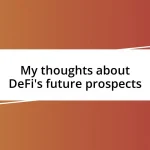Key takeaways:
- Understanding that every trade of altcoins can trigger taxable events, including swaps and transfers between wallets.
- Keeping detailed and organized records of transactions is essential for accurate tax reporting and managing tax obligations efficiently.
- Consulting with tax professionals and utilizing tax software can provide clarity, personalized insights, and automated tracking, making tax season more manageable.

Understanding altcoin taxation basics
When I first started trading altcoins, I was overwhelmed by the myriad of tax implications involved. It’s fascinating how the IRS treats cryptocurrencies like property rather than currency; each trade could trigger a taxable event. I remember the anxiety that crept in when I realized that every time I swapped one altcoin for another, I needed to calculate the capital gains or losses.
Many new traders might not realize this until it’s tax season. For instance, when I sold a portion of my altcoin holdings to reinvest in a promising project, I had to account for every percentage change in value since my initial purchase. It made me wonder: how many others find themselves in a similar situation, frantically trying to recall the exact price movements of their investments?
Tracking these transactions can be tricky, especially when dealing with multiple exchanges and wallets. I learned the hard way that keeping detailed records was essential, not just for accuracy, but also for peace of mind during tax filing. Have you ever faced a mountain of receipts and trades and felt completely lost? That feeling of being in over your head is all too common!

Recognizing taxable events in altcoins
Recognizing taxable events in the world of altcoins can be quite tricky, especially if you’re navigating it for the first time. I remember during my own journey when I learned that just moving altcoins between wallets could qualify as a taxable event—my heart sank at the thought of adding another layer of complexity to my trading. Each action can lead to implications, which I found both fascinating and overwhelming.
Here are some common taxable events to keep in mind with altcoins:
- Selling altcoins for fiat currency
- Trading one altcoin for another (even if it feels like “just swapping”)
- Earning altcoins through mining or staking
- Receiving altcoins as payment for goods or services
Understanding these events can help you prepare for tax season. I recall sitting down with my records and feeling a mix of dread and determination as I pieced together my transaction history, knowing it would ultimately pay off when it came time to report my earnings.

Tracking altcoin transactions accurately
Tracking altcoin transactions accurately is something I didn’t take seriously at first. I once found myself sifting through months of transaction history from different exchanges, trying to reconstruct my investment journey. The sheer volume of trades made it overwhelming, and I realized that without a solid tracking system, I was setting myself up for headaches come tax time. I learned that employing a dedicated tool or software was essential in managing and organizing my data efficiently. Ever get that sinking feeling when staring down a messy spreadsheet? I definitely have!
I found that documenting transactions right after they occur made a huge difference in my accuracy. For example, after I sold some altcoins during a market surge, I quickly noted both the sale price and the purchase price. It became a habit that saved me countless hours of stress later. Have you ever tried to track something weeks after it happened? It’s almost like piecing together a puzzle with missing pieces.
Additionally, I adopted a simple yet effective method to track transactions across various wallets. I created a comparison table to summarize my transactions by date, amount, and price. This visual representation gave me clarity, and it made it easier when I met with my tax consultant. Let me show you what that looks like:
| Date | Transaction Details |
|---|---|
| 2021-03-01 | Purchased 2 ETH for 4 ALT |
| 2021-03-10 | Sold 1 ALT for $100 |

Consulting with tax professionals
When it comes to navigating the intricate world of altcoin taxes, consulting with tax professionals proved to be a life-saver for me. I remember feeling overwhelmed by all the nuances and regulations, so I decided to seek expert advice. It was reassuring to discuss my unique situation with someone who could clarify the complex tax implications, especially concerning different types of transactions. Have you ever tried to make sense of tax regulations on your own? It can feel like reading a foreign language!
In my experience, a knowledgeable tax professional can offer personalized insights that online resources often miss. During our meeting, I was surprised to learn that strategies, such as tax-loss harvesting, could potentially offset my gains from profitable altcoin sales. It’s those little nuggets of wisdom that make a huge difference! You really don’t know what you don’t know until someone points it out.
After consulting with my tax professional, I left the session with actionable steps tailored to my circumstances. I remember feeling a weight lift off my shoulders as I finally had a clear plan for tracking, reporting, and minimizing my tax obligations. No more second-guessing! Working with an expert not only provided clarity but also peace of mind that my tax filings would be accurate and compliant. Have you ever found comfort in knowing you’ve made informed financial decisions? It’s truly empowering.

Reporting altcoin gains and losses
When it comes to reporting altcoin gains and losses, I’ve learned the importance of being meticulous. I remember the first tax season after I started trading— I was confused about whether to report every transaction or just the final outcome. I settled on reporting every gain and loss. After all, the IRS requires meticulous records, and trying to guess later can be a recipe for disaster. Have you ever missed a piece of paper and regretted it later? I certainly have.
To keep everything in order, I started categorizing my transactions by type, such as long-term versus short-term gains. This approach helped clarify how each sale would be taxed. I also realized that coinciding the year-end statement from exchanges with my notes was a smart move. I once overlooked a significant loss because I wasn’t organized, and that taught me not to be complacent. Have you ever had a moment where you thought, “How did I miss that?” It can be frustrating!
Additionally, I began using crypto tax software that automatically synced with my wallets. This saved me a massive headache and minimized errors. I love how technology can lend a hand in making our lives easier. One of my favorite features was the ability to generate tax reports and summaries at the click of a button. Do you find it empowering to leverage tools that simplify complex tasks? It certainly felt good to gain that control and clarity over my financial landscape.

Utilizing tax software for altcoins
Utilizing tax software for altcoins was a game changer in my journey. At first, I was skeptical about relying on technology, but once I gave it a shot, it transformed how I managed my crypto transactions. I still remember the relief I felt when I could automate the tracking of my trades instead of manually inputting each one—what a time-saver! Have you experienced anything similar with tech simplifying your tasks?
One of the standout features I loved was the ability to import data from various exchanges seamlessly. This was a relief, especially during the chaotic tax season. I used to dread the painstaking process of gathering all transaction histories, but now I just link my accounts, and voilà! It’s like having a personal assistant dedicated to my altcoin tax needs. Have you embraced any tools that helped ease your burdens? I highly recommend exploring those options.
The comprehensive reporting options in the software also served me well. I could visualize my gains versus losses clearly—not just numbers on a page but insights that shaped my trading strategy. With detailed analytics at my fingertips, I could assess my performance and decide my next moves wisely. Did you ever feel empowered by making data-driven decisions? That’s how I felt—there’s something undeniably exciting about harnessing technology to elevate your financial acumen.














